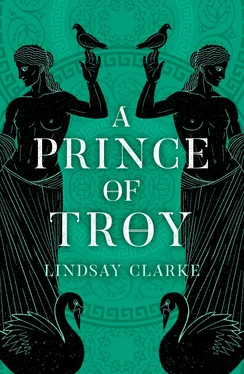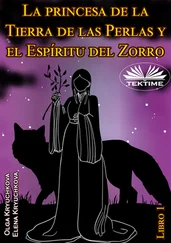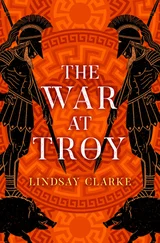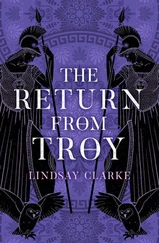Once sure she was asleep, he made his prayer to Zeus, lay down over her and clasped her body in a firm embrace. Thetis started awake at his touch, alarmed to find her limbs pinioned in the grip of a man. Immediately her body burst into flame. A torrent of fire licked round Peleus’s arms, scorching his flesh and threatening to set his hair alight, but Cheiron had warned him that the nymph had acquired her sea-father’s power of shape-shifting, and that he must not loosen his hold for a moment whatever dangerous form she took. So he grasped the figure of flame more tightly as Thetis writhed beneath him and took him on a fierce dance that wrestled him through all the elements.
When she saw that fire had failed to throw him, the nymph again changed shape. Peleus found himself floundering breathlessly as he clutched at the weight of water in a falling wave. His ears and lungs felt as though they were about to burst, but still he held on until the waters vanished and the hot maw of a ferocious lion was snarling up at him, only to be displaced in turn by a fanged serpent that hissed and twisted round him, viciously resisting his embrace. Then, under his exhausted gaze, the serpent took the shape of a giant cuttlefish, which sprayed a sticky gush of sepia ink over his face and body. Already burnt, half-drowned, mauled by fangs and talons, and almost blinded by the ink, Peleus was on the point of releasing his prize, when Thetis suddenly yielded to this resolute mortal who had withstood all her powers.
Gasping and breathless, Peleus looked down, saw the nymph resume her own beautiful form, and felt her body soften in his embrace. The embrace became more urgent and tender, and in the hour of passion that followed, the seed of their first son was sown.
The wedding-feast of Peleus and Thetis was celebrated at the full moon outside King Cheiron’s cave in the high crags of Mount Pelion. It was the last occasion in the history of the world when all twelve immortal gods came down from Mount Olympus together to mingle happily with mortal men. A dozen golden thrones were set up for them on either side of the bride and groom. Sky-Father Zeus himself gave away the bride, and it was his wife Hera who lifted the bridal torch. The Three Fates attended the ceremony, and the Muses came to chant the nuptial hymns, while the fifty daughters of the sea-god Nereus twisted their line about the gorge in a spiral dance of celebration.
As their gift to Peleus, the Olympian gods presented him with a suit of armour made of shining gold, together with two immortal horses sired by the West Wind. King Cheiron gave the groom a matchless hunting spear, the head of which had been wrought by the lame god Hephaestus in his forge, while its ash-wood shaft had been cut and polished by the hands of Divine Athena. With the whole remaining tribe of Centaurs gathered in garlands for the occasion, and all the other revellers carousing on nectar served by Zeus’s cup-bearer Ganymede, everyone agreed that there had been no more joyful marriage-feast since the Olympians had honoured the wedding of Cadmus and Harmony with their presence many years before.
Yet alone among the immortal gods, Eris had not been invited. Her name means Strife or Discord , and she is twin-sister to the war god Ares. Like him she delights in the fury and tumult of human conflict. It is Eris who stirs up trouble in the world by spreading rumours. She takes particular pleasure in the use of malicious gossip to create envy and jealousy, and for that reason none of the gods and goddesses other than her brother cares to have too much to do with her. For that same reason her name had been omitted from the list of guests at the wedding-feast of Peleus and Thetis. Yet all of the immortals have their place in the world and we ignore any of them at our peril.
Furious and slighted that she alone among the immortals had not been invited, Eris looked on at the festivities from the shadows of a nearby grove, waiting for the right moment to take her revenge. That moment came as Hera, Athene and Aphrodite were congratulating Peleus. The groom’s eye was caught by a flash of light as something rolled towards him across the ground. All three of the goddesses exclaimed in wonder when he picked up a golden apple that lay glistening at his feet. With their curiosity excited by the goddesses’ cries of delight, other guests quickly gathered round. Only Cheiron, to his dismay, saw the figure of Eris in her chequered robe slip away into the trees.
‘Look’, Peleus exclaimed, ‘there’s an inscription here.’ Holding the apple to catch the light, he read aloud, ‘ To the Fairest .’ He turned to appraise the three goddesses standing beside him, and his smile instantly faded with the realization that he could not give the apple to any one of them without immediately offending the others.
‘But I’m surrounded by beauty,’ he prevaricated. ‘This riddle is too hard.’
Aphrodite smiled at him. ‘To the Fairest, you say? Then there’s no difficulty. The apple must be meant for me.’ The goddess was holding out her hand to take it when Hera said that as wife to Zeus, Lord of Olympus, there could hardly be any doubt that the apple should be hers.
‘There is every possibility of doubt,’ Athena put in. ‘Any discriminating judge would agree that my claim to the apple is as strong as either of yours – if not a good deal stronger.’
Aphrodite laughed, dismissing Athena’s claim as ridiculous. Who would look twice, she asked, at a goddess who insisted on wearing a helmet even to a wedding? Smiling in reparation, she conceded that Athena might be wiser than she was, and there was no doubting Hera’s matronly virtue, but if beauty was the issue, then she had the advantage over both of them. Again, sidling closer to Peleus who stood in a consternation, wondering how he had got into this quandary and how to get out of it again, she held out her hand.
‘Can’t you see you’re embarrassing our host, flaunting yourself like that with his bride looking on?’ Athena protested. ‘Perhaps one day you’ll learn that true beauty is also modest.’
Sensing the imminence of an unseemly quarrel, Hera intervened, warning her divine sisters to restrain themselves. Then she smiled at Peleus and suggested that it would be best to settle the matter quickly by giving the apple to her. At which both the other goddesses turned on her, each clamouring to be heard over the other until all three were tangled in a rancorous exchange. The Muses faltered in their song, the Nereids ceased their dance, a nervous silence fell across the Centaurs, and the bride and groom looked on in dismay as the dispute became ever more acrimonious.
Hera spoke sharply above the others. ‘If you two won’t see reason, there’s only one way to resolve the matter – Zeus must decide.’ But neither of the others was about to accept that solution, nor did Almighty Zeus show any enthusiasm for it. Though he’d been drinking nectar all afternoon, he remained too astute to put himself in a position where his life would be made miserable by his wife if he was honest, or by two resentful goddesses if he was not. Hoping the row would peter out, he turned away. Only moments later, netted in a trance of rage, all three contenders began hurling insults at each other.
‘Enough!’ bellowed Zeus in a voice that briefly silenced everyone. ‘If it’s golden apples you want, all three of you can have a whole orchard of them any time you like.’
‘It’s not the apple!’ Hera answered hotly. ‘None of us cares about the apple!’
‘Of course we don’t,’ Athena agreed.
‘Then why are you embarrassing us all like this?’ Zeus demanded. When no immediate answer came, he said it was time the goddesses remembered who they were and where they were. They should stop this bickering and sit down and enjoy themselves, so that everyone else could do the same. Again he tried to turn away but Aphrodite widened her eyes, protesting that the dispute was a matter of simple justice. She wasn’t about to let some pretender lay claim to a title that everyone knew was rightly hers.
Читать дальше












